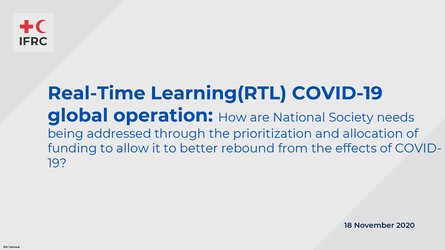
To help improve the efficiency and effectiveness of the IFRC secretariat response to COVID- 19, PMER has been piloting an “active learning” approach to carry out real-time learning on targeted areas of the response. This approach is informed by the global scope, scale and rapidly changing nature of the COVID-19 pandemic and the response. This second pilot aims to reach out to a wider range of stakeholders from Recipient National Societies, Donor National Societies and the IFRC secretariat, with questions identified by management/stakeholders at different points in the operation. This light and flexible approach substitutes the Real-Time Evaluation (RTE), which would be challenging to apply for this operation, but does not replace mid- or end point evaluations when the response is more stable. Question 2 looked at “How are National Society needs being addressed through the prioritization and allocation of funding to allow it to better rebound from the effects of COVID-19?” This learning aims to complement the exercise Mobilize, Execute and Transform with Agility to Respond to COVID-19 which was carried out in April and it is hoped that the feedback will better help the IFRC secretariat adapt its operational response to better meet the needs of member National Societies worldwide